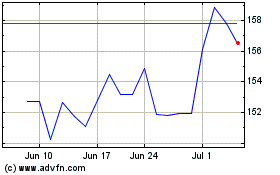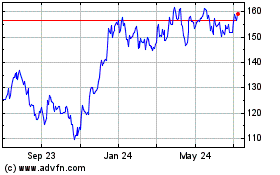CORRECT: Capital One Wins ING's US Online Bank - Sources
June 16 2011 - 5:22PM
Dow Jones News
ING Groep NV (ING, INGA.AE) decided to sell its U.S.
online-banking business to Capital One Financial Corp. (COF),
according to people familiar with the matter.
Disclosure of the deal, valued at $9 billion, is expected soon.
Capital One will pay $6.2 billion in cash and $2.8 billion in stock
for ING Direct USA, which will give ING about a 10% stake in the
McLean, Va., bank, according to a person with direct knowledge of
the matter.
Capital One will raise $2 billion in fresh capital before the
deal closes, expected later this year, this person said. Its shares
rose $1.13, or 2.4%, to $49.00 Thursday in a mixed market for bank
stocks.
Capital One is currently the ninth-largest bank in the U.S. by
deposits; adding ING Direct would make it No. 5, putting it ahead
of PNC Financial Services Group Inc. (PNC) and U.S. Bancorp (USB).
Bank of America Corp. (BAC) is No. 1.
Standard & Poor's equity analyst Robert McMillan said the
deal could be positive for Capital One because it is lowering its
cost of making loans, and diversifies its funding sources. But he
said he is worried about the dilution that the deal might cause to
shareholders.
The stock that Capital One would issue to pay ING and to raise
capital is "at the high end" of what Keefe, Bruyette & Woods
Inc. analyst Sanjay Sakhrani said he expected the bank to need for
an ING deal.
"In isolation, this wouldn't be an ideal deal," he said. "But it
puts them in a position to do something else," such as pursuing
another acquisition, preferably of a loan business, or to buy back
shares or raise the dividend.
As previously reported by Dow Jones Newswires, Capital One has
also made a complementary bid for HSBC Holdings PLC's (HBC,
HSBA.LN, 0005.HK) U.S. credit-card business, according to people
familiar with the matter. The bidding for HSBC's cards business is
in the early stages. Capital One could fund the expanded card
business with the ING deposits, allowing it to grow at a time when
consumers are reluctant to take on new debt and the economy is
sputtering.
ING Direct is one of the largest and most successful online
deposit gatherers, with $82 billion of deposits and seven million
customers that proved more loyal to the online bank than banking
analysts and consultants expected when Internet banking emerged as
a standalone banking strategy just over 10 years ago.
Capital One, meanwhile, has been transforming itself from a
credit-card lender to a bank to use more stable deposits to fund
its loans, and created its own online bank. It has since bought
three traditional banks.
The deal's $9 billion value reflects the tangible book value of
ING Direct and a very low deposit premium of less than 1%. However,
almost all of ING Direct's deposits are what is known as "core
deposits" as defined by the Federal Deposit Insurance Corp.,
according to regulatory filings. Such core deposits, mainly
savings- and checking-account deposits from consumers rather than
big-ticket certificates of deposits from institutional clients such
as mutual and pension funds that can leave a bank quickly, are key
for bank funding and often determine the value of bank deals.
The deal is expected to be accretive to earnings in 2012, said
the person familiar with the matter.
ING, of Amsterdam, was ordered by the European Commission to
sell the business by 2013 as a condition for government aid it had
received during the financial crisis. The forced disposal is part
of a wider restructuring plan.
Capital One was bidding for ING Direct along with General
Electric Co. (GE), according to people familiar with the matter.
But Capital One was more willing than the industrial conglomerate
to take on mortgages and mortgage-backed securities that are part
of the online bank, those people said.
ING Direct comes with about $40 billion in mortgages and $30
billion of securities, mainly mortgage-backed ones issued by Fannie
Mae (FNMA) and Freddie Mac (FMCC) and other U.S. agencies,
according to the most recent regulatory filing.
Some of the securities are backed by risky "alt-A" mortgages
that require less documentation at origination than mortgages
backed by Fannie Mae and Freddie Mac.
A person familiar with the deal said Capital One won't need to
write down the value of the securities it is purchasing from ING,
and will reduce the value of the mortgages it acquires by 4%,
reflecting an expected rate of future delinquencies. Most of the
mortgages were underwritten by ING directly rather than by brokers
or purchased from other banks, and were originated in 2008 or
later, when lending standards had already tightened, including FICO
scores and loan-to-value ratios.
-By Matthias Rieker, Dow Jones Newswires; 212-416-2471;
matthias.rieker@dowjones.com
--Anupreeta Das and Gina Chon contributed to this article.
PNC Financial Services (NYSE:PNC)
Historical Stock Chart
From May 2024 to Jun 2024

PNC Financial Services (NYSE:PNC)
Historical Stock Chart
From Jun 2023 to Jun 2024
